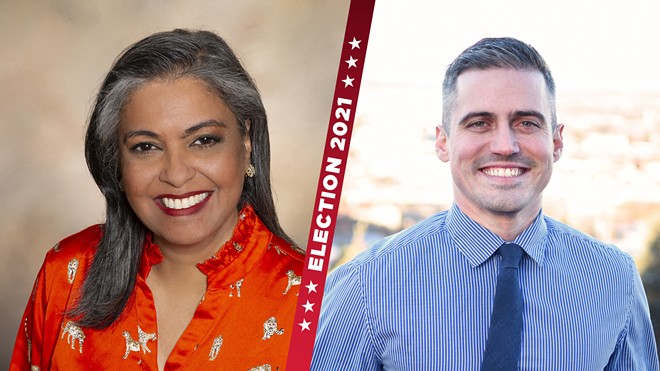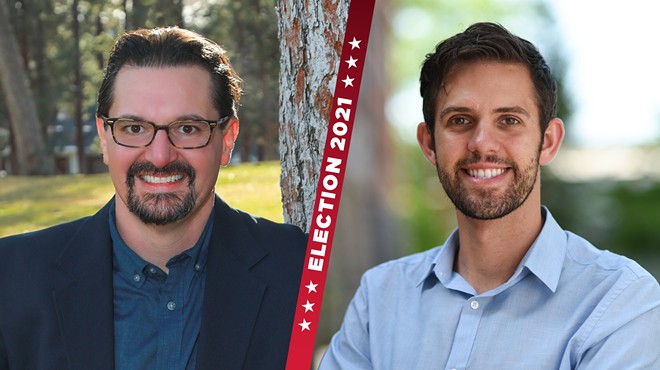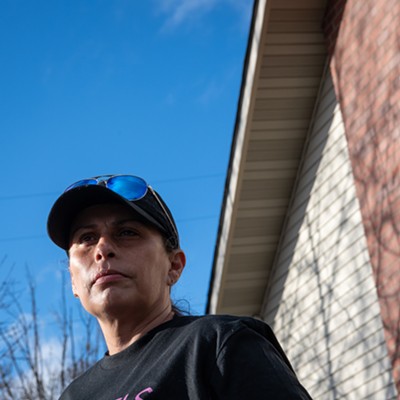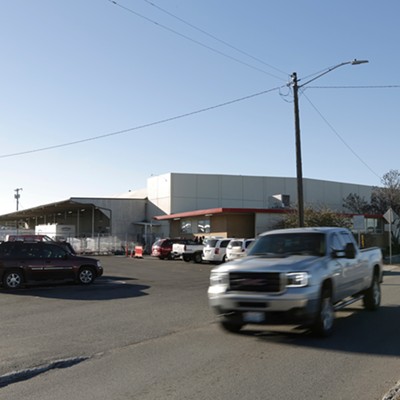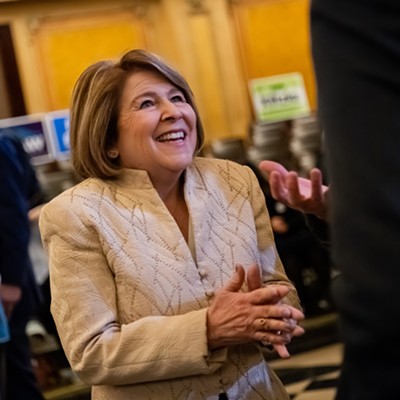As NAGHMANA SHERAZI cooks a Pakistani omelet breakfast on a Saturday morning, her apartment is chaotic — half-unpacked Walmart groceries in the kitchen, her son's half-finished electronic projects on the counter. It's the sort of side to a politician most reporters don't get to see. But this, in its own way, is part of her pitch: That she's connected to the real concerns, the real lives — in all their chaotic messiness — of the people in her district.
"We need voices like mine at the table," she says. "People like me are not represented on Spokane City Council."
She's Pakistani, yes, and she's a Muslim and an immigrant and a single mom, but that's not the diversity she's talking about:
"I'm a renter," she says.
In the midst of Spokane's housing crisis, she says she understands what it's like to feel the squeeze. Her landlord donated to her campaign, but still raised her rent by $150.
Politics in northeast Spokane's District 1 are more complicated than simple ideology: For the past four years, the most conservative member of the council and the most progressive member have been from this district.
It's also the district with the lowest voter turnout, the highest unemployment, and the most unpaid utility bills. Sherazi knows what having an unpaid electric bill is like, too. She was a half-month behind on her electric bill.
She quit her job at Gonzaga's Office of Diversity, Equity & Inclusion to focus on her campaign. But now, like so many people in her district, she's on that precipice of poverty herself.
"I am in danger of being evicted, God forbid, if I can't make ends meet," Sherazi says. "I really truly am one of those people who live in fear of being homeless."
JONATHAN BINGLE crackles with a sort of bright-eyed Young Life-style energy that makes it obvious he used to be a youth pastor. He's the type of Evangelical politician far more likely to call local reporters and invite them to his church than to decry them as "godless" or duck their phone calls.
Two years ago, Bingle told the Inlander that he'd felt led by the Holy Spirit to run for mayor. For him, he says, it's more a powerful gut feeling, not an audible voice. This time, he says, he didn't have that feeling when deciding to run for city council.
Still, he's almost in perfect alignment with the religious right: When "We Believe We Vote," a local conservative Christian organization that produces voter guides, gave Bingle their candidate survey, he gave the maximum 10 points of "strongly agree" to every one of their positions, from fighting against masks, to opposing public funding for drag queen story hours, critical race theory and cultural competency programs.
Abortion is "the greatest moral evil occurring in the United States today," he writes in the survey comments.
"This is probably an issue I can't impact at the city level, but if I could I would outlaw it tomorrow," Bingle says.
At the city level, however, he says his number one focus is crime: Spokane — like almost everywhere in the country — saw a sharp spike in homicides and shootings last year. He accuses the city council of making things harder for the cops by supporting controversial state-level police-reform legislation.
"Right now we have a police force that wants to do the right thing, but is also very, very worried that somebody is going to video them," Bingle says, "and even if they did the right thing, their life is going to be ruined."
That's a big contrast from Sherazi's: In a Facebook post last year, she wrote that "I stand with the Movement for Black Lives' call to defund the police." But by that, she wrote, she meant redirecting some of the funding away from military-style police equipment toward social services and health care, not zeroing out the police budget.
"It DOES NOT mean no police — it just means using the police force for the things it is needed for," she wrote.
So does she think that the police department funding should increase or decrease? It depends on the issue: More beat cops riding bikes and getting to know the Hillyard neighborhood is good, she says, but "for mental health issues, you cannot send out police officers, that's just ridiculous."
Most of the differences between the candidates mirror the liberal-conservative divide. Sherazi supports the city's sustainability plan, Bingle opposes it. Bingle takes a tough-love approach to homelessness — suggesting the city require labor for some to access some services — while Sherazi accuses Bingle of "wanting to criminalize the homeless."
"These are people like me," she says.
Both support amending the city's single-family zoning to allow duplexes and triplexes to be built to help fix the housing plan. But while Bingle — who works as a contractor — argues that the city needs to fight against anti-sprawl restrictions to allow more housing to be built on the outskirts of Spokane County, Sherazi proposes capping rent increases. State and national realtor organizations have poured money into Bingle's campaign, while Sherazi's biggest donors have been labor organizations.
Even her campaign workers are organized, their union contract guaranteeing them a minimum of $16 an hour. (Sherazi says the public disclosure report stating some canvassers were getting paid an illegally low $12-an-hour was a since-corrected treasurer error. Multiple current and former campaign employees, including one of the canvassers, backed up Sherazi's account.)
In the midst of a pandemic, however, the issues that defined the political divide have expanded: Bingle's church began meeting again in person before Inslee's restrictions on churches were lifted. While they tried meeting online, he says "it just did not feel that we were doing what God was asking us to do."
Bingle refuses to say on-the-record whether he got the vaccine — calling it "a very private and personal" decision made with his wife and their doctor.
But when the Inlander argues that vaccines aren't just a personal decision, that preventing COVID from spreading is a social responsibility, Bingle's frustration over the last year and a half comes out: He thinks about how much damage the pandemic restrictions did to his bar trivia business, how he applied for all the aid programs, but didn't receive any.
"We're a business that got smoked because we understood our social responsibility," Bingle says. "We have given more than most people can understand."
But Sherazi understands the gravity of social responsibility, too. Her son, she says, is immunocompromised. He relies on others being vaccinated to stay safe.
This is the sort of tension that, in other contexts, has turned into screaming matches and accusations. And yet, both candidates say that they consider each other friends. Bingle says that when his wife gave birth, Sherazi brought their family multiple home-cooked dinners.
"When that happens, you expect your church to step up and do that — and she did it more than anyone else in our church," he says.
After all, faith is important to Sherazi, too.
"Being Muslim, the biggest thing is that you believe in humanity, and you believe in service and you believe in helping others," she says.
There's a similarity she has with Bingle. At the beginning of the pandemic when Sherazi was worried about putting her son at risk by going to the grocery store, Sherazi says, Bingle went to pick up her groceries from WinCo.
"We're pretty wildly different, politically," Bingle says. "But we can sit down and have coffee."
Their similarities matter at the dinner table and the apartment doorstep. But it's on the council dais that their wild differences will come into play. ♦

